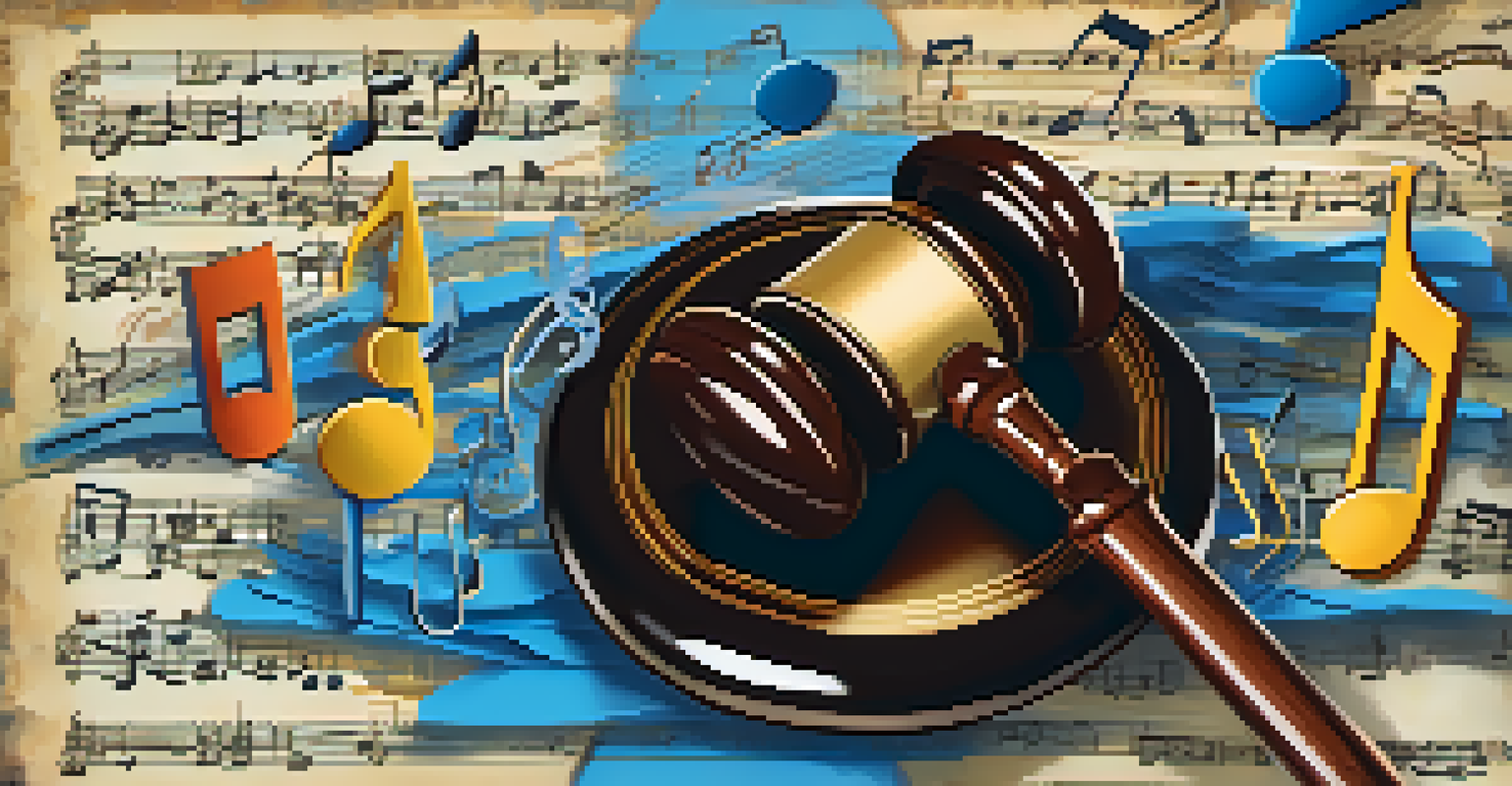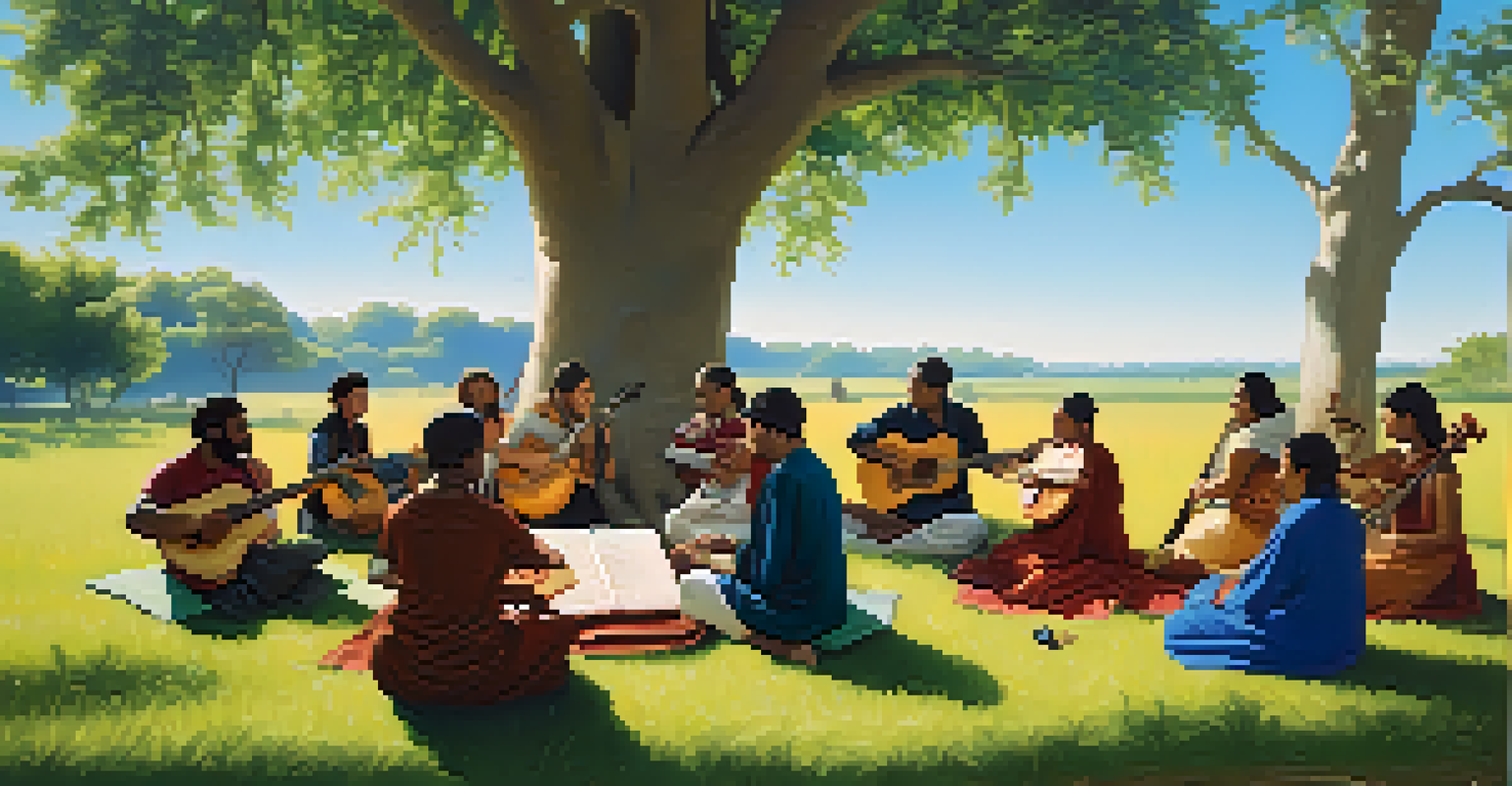Ethical Implications of Crowdsourced Music Creation Platforms

Understanding Crowdsourced Music Creation Platforms
Crowdsourced music creation platforms are online spaces where artists collaborate, share, and produce music together. These platforms allow musicians from various backgrounds to contribute their skills, whether it's songwriting, producing, or performing. Think of it as a digital jam session, where contributions come from all corners of the globe, fostering creativity and diversity.
Music is the shorthand of emotion.
However, the ease of collaboration raises questions about ownership and credit. When multiple contributors are involved, determining who gets recognition for a piece of music can become murky. This complexity leads to a critical examination of the ethics surrounding authorship and intellectual property rights.
As we dive deeper into these platforms, it’s essential to understand the balance between collaboration and individual recognition. The excitement of creating together is thrilling, but we must ensure that all voices are heard and acknowledged fairly in the final product.
The Role of Copyright in Crowdsourced Music
Copyright is a legal framework that protects creators’ rights over their original works. In the context of crowdsourced music, it becomes a vital issue, as contributions can come from numerous individuals, each with their own legal claims. This can lead to disputes over who owns the rights to a song, especially if contributors have different expectations.

For instance, if a guitarist uploads a riff to a collaborative track, and a vocalist later adds lyrics, who legally owns that song? These questions can create tension and uncertainty among collaborators, highlighting the need for clear agreements upfront. Without these guidelines, the thrill of collaboration can quickly turn into a legal nightmare.
Collaborative Ownership Complexity
Crowdsourced music creation raises crucial questions about ownership and recognition among multiple contributors.
Understanding copyright in crowdsourced music is crucial for ensuring that all contributors feel secure and valued. By establishing clear ownership rights from the outset, creators can focus on their passion for music rather than worrying about potential disputes.
Ethical Considerations in Revenue Sharing
When it comes to monetizing music created on crowdsourced platforms, ethical considerations must be front and center. Revenue sharing models vary widely, and it’s crucial that every contributor understands how earnings will be divided. Transparency is key to maintaining trust among collaborators and ensuring that everyone feels fairly compensated for their efforts.
The power of music makes all the difference in the world.
Imagine a scenario where a song becomes a hit, but only the primary artist receives the financial reward. This situation could lead to feelings of resentment among the other contributors who played significant roles in the song's creation. To avoid this, platforms should advocate for fair revenue-sharing practices that recognize all contributors equitably.
Ultimately, adopting ethical revenue-sharing practices can foster a harmonious community of creators. When musicians feel respected and valued, they are more likely to continue contributing their talents and collaborating on future projects.
The Impact of Cultural Appropriation
Cultural appropriation is a complex issue that arises in collaborative music creation, especially when artists borrow elements from cultures outside their own. This practice can lead to the commodification of cultural expressions and raises ethical questions about respect and representation. As artists collaborate globally, sensitivity toward cultural origins becomes increasingly important.
For example, if a musician from one culture samples a traditional melody from another without understanding its significance, it can be perceived as exploitative. Such actions can alienate the very communities that inspire creativity and lead to backlash against the artist. Acknowledging the cultural context of musical elements is vital for fostering respect and understanding.
Ethical Revenue Sharing Practices
Transparent revenue-sharing models are essential to ensure fair compensation for all musicians involved in a project.
Navigating the waters of cultural appropriation requires awareness and humility. By engaging in open dialogues and respecting the origins of cultural expressions, artists can create inclusive music that honors diverse backgrounds and traditions.
Anonymity and Accountability in Collaboration
Anonymity can be both a blessing and a curse in crowdsourced music creation. On one hand, it allows artists to express themselves freely without fear of judgment. On the other hand, it can lead to a lack of accountability, as contributors may feel emboldened to act unethically when their identities are hidden.
For instance, if an anonymous contributor plagiarizes another artist’s work, it can be challenging to address the issue without knowing who is responsible. This lack of accountability can undermine the collaborative spirit that these platforms aim to foster. Therefore, finding a balance between anonymity and accountability is essential for a healthy creative environment.
By encouraging transparency while still allowing for some degree of anonymity, platforms can cultivate a culture of trust. When artists feel safe to share their work and also respect others’ contributions, the collaborative experience becomes richer and more meaningful.
The Need for Ethical Guidelines
As the popularity of crowdsourced music creation continues to rise, the need for ethical guidelines has never been more pressing. Establishing a set of best practices can help protect the rights of all participants and ensure a fair creative process. These guidelines should cover aspects like copyright, revenue sharing, and cultural sensitivity.
For example, platforms could create standard contracts that outline each contributor’s rights and responsibilities. By making these agreements readily available, artists can feel more secure in their collaborations and less likely to encounter disputes down the line. This proactive approach can foster a positive environment where creativity thrives.
Cultural Sensitivity in Collaboration
Artists must navigate cultural appropriation responsibly to respect the origins of musical elements and foster inclusivity.
Encouraging ethical practices not only benefits individual artists but also enhances the overall integrity of the music industry. When creators adhere to ethical guidelines, they contribute to a culture of respect, fairness, and collaboration that can inspire future generations of musicians.
Future Directions in Ethical Music Collaboration
Looking ahead, the future of crowdsourced music creation holds exciting possibilities, but it also requires a commitment to ethical practices. As technology evolves and new platforms emerge, so too must our understanding of the ethical implications involved. Artists and platforms alike should prioritize continuous education on these issues to foster an inclusive environment.
Emerging technologies like blockchain could provide innovative solutions to copyright and revenue-sharing challenges, allowing for more transparent transactions. By leveraging these advancements, musicians can ensure that their contributions are recognized and rewarded fairly. This shift could revolutionize the way music is created and shared.

Ultimately, the future of ethical music collaboration hinges on a collective effort to prioritize integrity and respect. By embracing these values, we can create a vibrant musical landscape that celebrates diversity and innovation while protecting the rights of all creators involved.